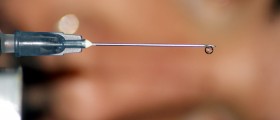
Gluten IntoleranceWhen a person suffers from gluten intolerance, we can say that he or she has coeliac (celiac) disease or tropical sprue/nontropical sprue. Celiac disease is a life-long inflammatory disease of the upper small intestine caused by intolerance to the gluten. Person can be genetically susceptible to the disease or can be born with it. Gluten is protein found in wheat, rye, barley and oats. Person with celiac disease is actually allergic to that protein.
Symptoms of Gluten IntoleranceWhen, a person is allergic to gluten, this protein can damage the lining in the intestines, known as the villi thus causing it to atrophy or become smaller. That lining plays a significant role in digestion and when it is damaged it cannot properly absorb water and nutrients. Because of this people with gluten intolerance are prone to many conditions related to malabsorption.
Celiac disease has variety of symptoms and adult symptoms are different of those in children. Diarrhea is one of the most common symptoms of gluten sensitivity that affects people of all ages with celiac disease. Weight loss is another common symptom. It is common in adults while children may not gain weight and grow properly. Anemia occurs due to iron or folate deficiency. Person with celiac disease may also experience bloating, pain in the abdomen, vomiting, fatigue and shortness of breath.
Causes
The factors that are believed to be the reason of gluten intolerance are: Genetic susceptibility to the illness A trigger that can be: virus or infection, pregnancy or stress. Exposure to gluten as a newborn before the gut barrier has fully developed.Diagnosis
In order to provide diagnosis, your doctor must perform several tests. These tests include lactulose intolerance tests, xylose absorption tests and shilling tests. These tests can confirm any digestive malabsorption diseases. But to definitely confirm gluten intolerance a doctor may order biopsy of the intestine lining. That can be done during gastroscopy or endoscopy procedure. A patient will be admitted to hospital and have to fast from 6 to 12 hour prior to the procedure. Before the procedure a doctor will apply local anesthetic to your throat. Then, he or she will insert an instrument and take a sample of the vili that will be sent to laboratory analysis.
Treatment
Presently, the only treatment for celiac disease is a life-long gluten-free diet. A nutritionist or a doctor can instruct you how to replace vitamins, minerals and fibers that you will be missing after altering your diet. With such a diet, all your symptoms should be relieved.

















Your thoughts on this
Loading...